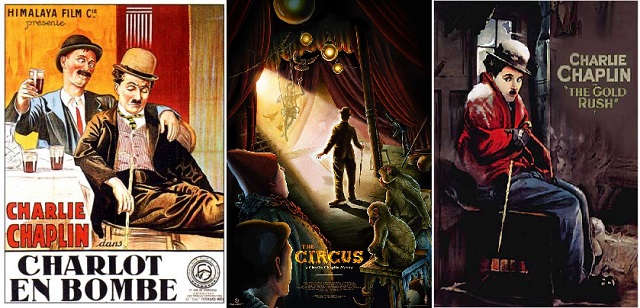A tramp, a slim and poor man but of great consistency, kindness and fortitude is ‘Charlot’, played by the great actor, director and musician, Charlie Chaplin.
He is a man who lives on the street, dressed in a tight and worn jacket, wide pants, boots, a bowler hat, and a flexible bamboo walking stick, which Chaplin bought at a New York umbrella shop, not far from Times Square.
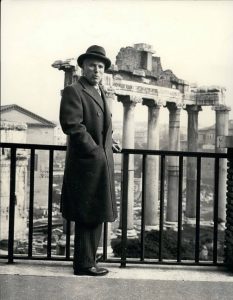
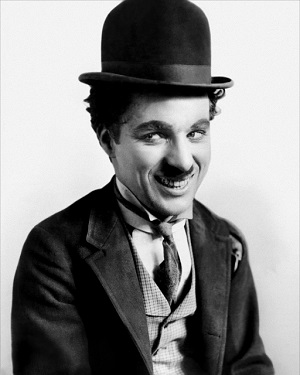
Chaplin wrote, directed, performed and composed the music for most of his films. Charlie Chaplin represents in his movies a physical expressiveness that does not need words; it is the silent cinema where the acting is made of gestures and silence. In fact, Charlie Chaplin said: “Silence is a universal gift that few can appreciate, perhaps because it cannot be bought.”
In the Walworth suburb of London, Charles Spencer Chaplin was born on May 16, 1889, in a poor neighborhood; his childhood was miserable, with the father, Charles Chaplin, a variety actor victim of alcoholism, and the mother, Hannah Harriette Hill, an actress and a singer.
After being in some Lambeth orphanages, supported by his brother Sydney, in 1910 Charlie began a collaboration with the theater impresario Fred Karno. At that time he has the opportunity to observe the many characters of certain English environments of the nineteenth-century, apparently “important” but in fact hypocritical and corrupt people. From these observations, Charlie will bring in his films that reality as social criticism between comedy and drama.
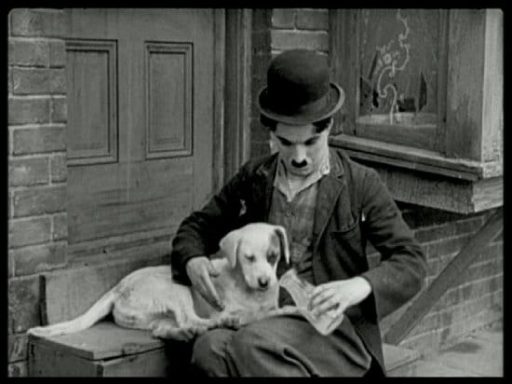 In 1906 Chaplin works in the circus, where he acts stage comedy, he learns a certain mime and physical agility, enters the company of Fred Karno with the support of his brother Sydney who already worked there, the pay is 3 pounds a week.
In 1906 Chaplin works in the circus, where he acts stage comedy, he learns a certain mime and physical agility, enters the company of Fred Karno with the support of his brother Sydney who already worked there, the pay is 3 pounds a week.
In 1913 Chaplin was noticed by the producer Mack Sennett who offered him a contract for the Keystone movie house. For the first time, the character Chas arrives on the big screen and will then become Charlot.
The first film he directed, in 1914, it’s titled “Twenty Minutes Of Love”, and has a simple story: a meeting in the park between a policeman and a girl.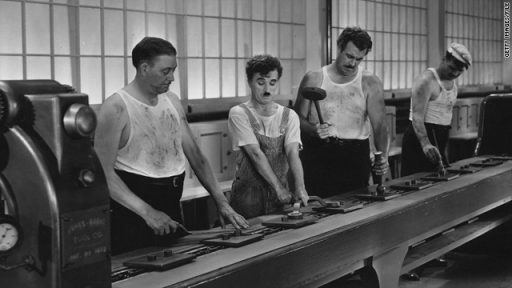
“Night out” is a 1915 comedy, with two friends who spend an evening to drink and to have amusement at a pub, and then at a hotel.
In 1916, Charlie Chaplin decides to create a new character, the tramp Charlot in different roles: Charlot at the skating rink, as a boxer, a fugitive, a journalist. He is a man who tries to survive and in all ways to be a part of a society that unfortunately continues to drive him away
Charlie Chaplin tells a story of immigrants aboard a steamship across the Atlantic Ocean in the “Immigrant,” a romantic comedy written and directed by him in 1917. When the immigrants approach Ellis Island, they see the Statue of Liberty in the midst of New York harbor, and everybody lands in America with their own dreams and hopes. In “Sunnyside,” a 1919 film, Charlot works on a farm where he’s exploited by the boss.
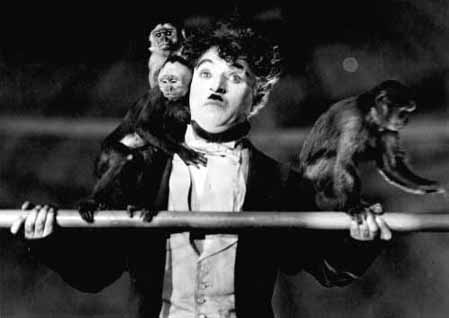
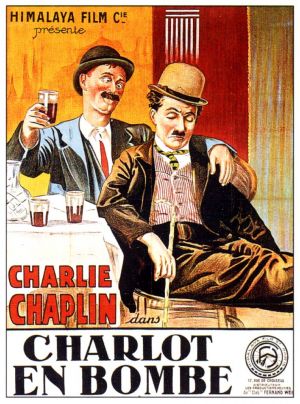 His gags are not programmed, Charlie Chaplin directs spontaneous films in which Charlot communicates the hypocrisy and selfishness behind the bourgeois’ respectability.
His gags are not programmed, Charlie Chaplin directs spontaneous films in which Charlot communicates the hypocrisy and selfishness behind the bourgeois’ respectability.
Charlot also works with animals on funny, adventurous movie scenes: in “A dog’s life,” realized in 1918, Charlot meets a dog as friend and partner; in “Pay day,” film of 1922, there is the nice scene when Charlot returns home from work, he buys a sausage for lunch and when he arrives at his apartment he finds on the table a group of pretty cats, meanwhile another kitten approaches the table and takes the sausage. Chaplin plays with a bear on the set of “Gold rush,” filmed in 1925. He performs some scenes with a tiger, a lion and some small capuchin monkeys in “The circus” in 1928; in it there is a crazy scene where Charlot is making an acrobatic performance, walking on a tightrope while some capuchins leap and climb up on him, a monkey sitting on his face with his tail in Charlot’s mouth, a second monkey undressing him, and a third throwing banana peel on the rope.
His first feature film is “The kid” (1921), which tells of a child abandoned by his mother; a film partially autobiographical. Charlot, with tenderness and courage, takes care of the child; in the scenes of the film there are reflections on loneliness, the precariousness of human relations, and poverty.
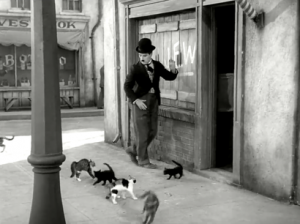 In the film “City lights” (1931), the impossibility of relationships, friendship and love is brought to the stage to show that in society the cause of everything is capitalism, which destroys every aspect of life. The blind florist who exchanges Charlot for “a rich duke so good” is a naive figure in a world where you have to pretend to survive. The beautiful final shot, in which Charlot has to do without words, represents the lack of communication in a world where many times it is difficult to live. But the description of capitalist society finds its highest expression in “Modern Times” (1936), a masterpiece of silent cinema where a worker reduced to machine gear is the perfect reproduction of the alienation of the exploited individual, made himself a machine, without space for his free time.
In the film “City lights” (1931), the impossibility of relationships, friendship and love is brought to the stage to show that in society the cause of everything is capitalism, which destroys every aspect of life. The blind florist who exchanges Charlot for “a rich duke so good” is a naive figure in a world where you have to pretend to survive. The beautiful final shot, in which Charlot has to do without words, represents the lack of communication in a world where many times it is difficult to live. But the description of capitalist society finds its highest expression in “Modern Times” (1936), a masterpiece of silent cinema where a worker reduced to machine gear is the perfect reproduction of the alienation of the exploited individual, made himself a machine, without space for his free time.
The film was liked in Europe, but less in America where people began to build a certain distrust towards Chaplin who was becoming more and more political. He was investigated by McCarthyism, and spied upon by the FBI
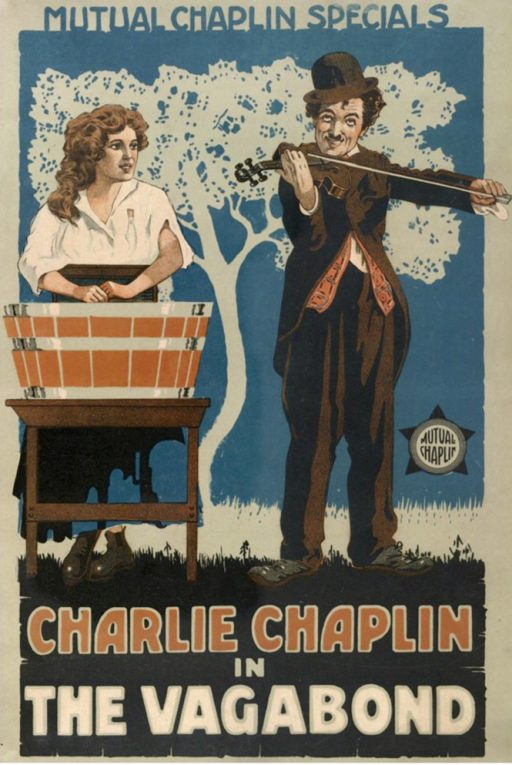 With “Modern Times” and even more with “The Great Dictator” 1940, Chaplin was accused of communism by the Commission for Anti-American Activities (House Committee on Un-American Activities, HCUA).
With “Modern Times” and even more with “The Great Dictator” 1940, Chaplin was accused of communism by the Commission for Anti-American Activities (House Committee on Un-American Activities, HCUA).
In 1952, the film “Limelight” tells of a misunderstood artist. His character of the vagabond represents the problems of many other people, the difficult conquest of a job, a place in the society, the only meaning of this life; among people, he finds the sincere company of an animal, a dog or a cat and sometimes the sympathy and the understanding of a woman, an affection that he finds precisely because they share with him the same condition of loneliness too.
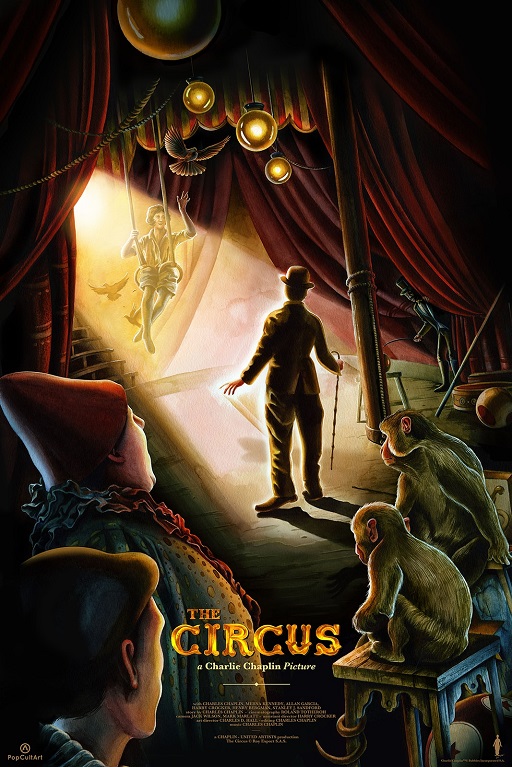
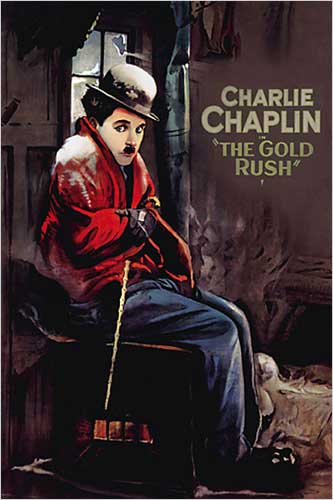 Chaplin embarked on the Olympic and returning to London, visited the neighborhoods of Lambeth and Kennington, the places of his childhood, traveling with his family to London, where the world premiere of “Limelight” would take place, which was supposed to be followed by a holiday period. On the ship, he was reached by the notification of the United States Attorney General on the basis of which his permission to return to the USA was canceled, so he moved to Switzerland, on the estate of “Manoir de Ban”, in the commune of Corsier-sur-Vevey.
Chaplin embarked on the Olympic and returning to London, visited the neighborhoods of Lambeth and Kennington, the places of his childhood, traveling with his family to London, where the world premiere of “Limelight” would take place, which was supposed to be followed by a holiday period. On the ship, he was reached by the notification of the United States Attorney General on the basis of which his permission to return to the USA was canceled, so he moved to Switzerland, on the estate of “Manoir de Ban”, in the commune of Corsier-sur-Vevey.
Rehabilitated by American public opinion only at the beginning of the seventies, he returned to his country of adoption to withdraw the Oscar for his career.
In Italy, Chaplin’s comedies arrived between 1915 and 1916, some advertising inserts were curated by Giuseppe Barattolo, founder of Caesar Film, on “La Cinematografia italiano e estera”, a news magazine also overseas. .In 1952, during the premiere of his movie “Limelight”, in Rome, Charlie Chaplin received a gold medal, making him an honorary high officer of the Italian Republic. Interviewed by the press, Charlie Chaplin thanked the audience, affirming his gratitude for Italy and the Italians, their art, culture, and hospitality. In France, he received the Légion of Honour award in 1971.
CHARLIE CHAPLIN MUSICIAN
Although not knowing how to read music, Chaplin had a great musical talent. He played the piano and accompanied with a sweet “hum”, creating the closed-lip melody, composing what would become the scores for the orchestra. In the case of “Modern Times,” Brock explained: “He came to the recording studio at nine in the morning; he ran the already edited film on the screen playing live music, accompanied by David Raksin, who wrote the entire score. Charlie Chaplin composed the music track of The Circus”, wrote the music for “The kid,” “Woman of Paris”, but his best-known soundtrack is “Limelight,” composed together with Raymond Rasch and Larry Russell, for which he won the Oscar in 1972.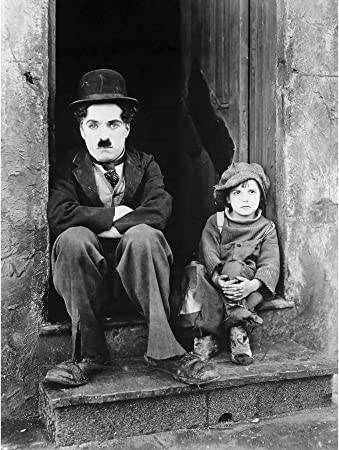
PHRASES OF CHARLIE CHAPLIN
Chaplin had a sensitive soul, a positive attitude to life, and strongly believed in human beings. Author of poems and songs, among which, “Smile,” Eternally,” and ” Spring Song .” Charlie Chaplin’s sentences are thoughts about life and the good qualities of people who would help them live in a better world. Here are some:
“I am a citizen of no place, I do not need documents and I have never felt a sense of patriotism for any country, but I am a patriot of humanity as a whole. I am a citizen of the world.”
“I suppose that’s one of the ironies of life, doing the wrong thing at the right moment.”
“They will always criticize you, speak badly of you, it’ll be hard to meet someone who will like you as you are, so live, do what your hear tells you to do…Life is like a play that does not allow testing. So sing, cry, dance, laugh and live intensely every day of your life, before the curtain closes and the piece ends with no applause.”
“I had no idea of the character. But the moment I was dressed, the clothes and the make-up made me feel the person he was. I began to know him, and by the time I walked onto the stage he was fully born”.
Poetry by Charlie Chaplin
“LIVE”
I forgave almost unpardonable errors,
I tried to replace irreplaceable people
and forgot unforgettable people.I acted on impulse,
I was disappointed by people
that I did not think they could do it,
but I too disappointed.I held someone in my arms to protect him;
I made friends for eternity.
I laughed when it was not necessary,
I loved and I was loved,
but I was also rejected.
I have been loved and I have not been able to reciprocate.
I shouted and jumped for so many joys, many.
I lived in love and made promises of eternity,
but I burned my heart so many times!
I cried listening to music or looking at the pictures.
I called only to hear a voice.
I’m in love again with a smile.
I again believed to die of nostalgia and…
I was afraid of losing someone very special
(which I ended up losing)…
but I survived!And I still live!
And life, I do not get tired…
And you too will not have to get tired of it.
Alive!It is really good to fight with persuasion,
embrace life and live with passion,
lose with class and win by daring,
because the world belongs to those who dare!
Life is too beautiful to be insignificant!
His films are what life is, moments of joy and sadness, moments of uncertainty and hope, a source of emotions to which sometimes we do not know how to react, Charlot was always himself, his loyalty and simplicity could be misunderstood for naivety but it was not so; these are the qualities of the right people.
Charlot is a disenchanted man, with a sweet and bitter smile, but always ready to fight, to appreciate the simplest and most authentic moments of existence, in the tears as in the smiles.
ANNA & MARIA SCIACCA


